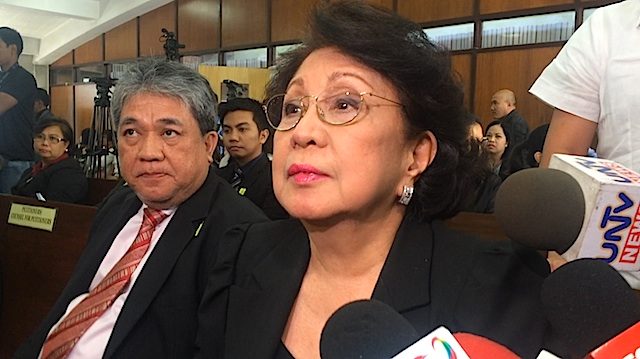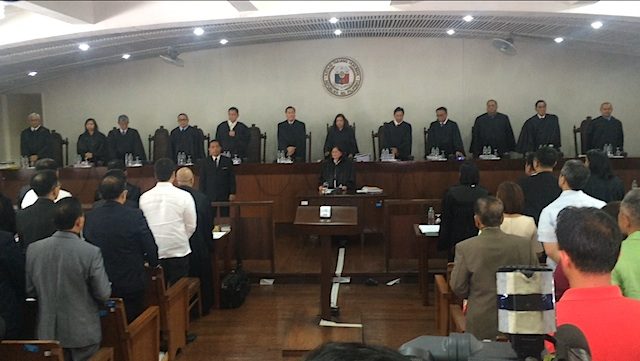SUMMARY
This is AI generated summarization, which may have errors. For context, always refer to the full article.

BAGUIO CITY, Philippines – How did the Supreme Court justices respond to the Ombudsman’s position that Makati Mayor Jejomar Binay should remain suspended because the Court of Appeals (CA) doesn’t have the power to stop the Ombudsman’s order?
This, in effect, renders the CA temporary restraining orders (TROs) meaningless.
Day 1 of the oral arguments on the powers of the Office of the Ombudsman was encouraging for the camp of Mayor Binay, they said, although they themselves acknowledged that oral arguments do not always provide a glimpse of how the magistrates are going to vote in the end.
It’s the first time Associate Justice Francis Jardeleza faced the new chief of his former office in an oral arguments hearing. Betraying no sympathy for a former colleague and for the other office he used to serve, he went straight to an issue that questioned the basis of the Ombudsman for filing the petition before the High Court.
“This seems to be the first time that the Ombudsman has advanced an interpretation that Section 14 withdraw from Court of Appeals its original Rule 65 jurisdction,” Jardeleza told acting Solicitor General Florin Hilbay, who inherited from him the task of standing up to Supreme Court justices to defend government cases.
“It took the Office of the Ombudsman 26 years, from 1989 which is the date of the enactment of the Ombudsman law, before it advanced its interpreation you are now arguing,” he added.
Jardeleza was Deputy Ombudsman for Luzon before he became Solicitor General and later Associate Justice of the Supreme Court.
Allow investigators unimpeded access to evidence
Hilbay is arguing for the Ombudmsan who is fighting a Court of Appeals TRO against the preventive suspension of Mayor Binay. The TRO is illegal, he argued, because Republic Act 6770 expressly prohibits courts from intervening to delay investigation.
Section 14. Restrictions. No writ of injunction shall be issued by any court to delay an investigation being conducted by the Ombudsman under this Act, unless there is a prima facie evidence that the subject matter of the investigation is outside the jurisdiction of the Office of the Ombudsman.
“I do not know whether or not this is the first time it was raised. But this is the first case that it has garnered sufficient attention with respect in particular with the power of the Ombudsman,” Hilbay responded to his former boss.
A preventive suspension is meant to remove the officials under question from their offices to make it easier for the Ombudsman to access documents and evidence that they might possibly attempt to hide or destroy while the Ombudsman is conducting its investigation.
A writ of injunction, such as a TRO, is a provisional but immediately executory remedy that preserves the status quo.
Gutsy Ombudsman
The Ombudsman was created by Congress in 1989 during the early years of the Cory Aquino administration. It was given vast powers to be able to fight graft and corruption. The history of the office, however, has been tarnished by slow case disposal, low conviction rates, and worse, allegations that some of its very own officials are involved in corruption.
It’s a reputation that the gutsy Ombudsman Conchita Carpio Morales sought to change when she assumed the post shortly after retiring from the Supreme Court in 2011. In a bold move during the impeachment trial of former Chief Justice Renato Corona in 2012, her office introduced a way to go around the bank secrecy law to expose Corona’s unexplained wealth. He was convicted and removed from office.
Now the Ombudsman is invoking Section 14 of the law that created her office to put a stop to the common practice of elected and appointed government officials running to the Court of Appeals when the Ombudsman is investigating them.
The lawyer of Mayor Binay, Claro Certeza, said this is a point they will raise again next week, April 21, when they take their turn to argue before the magistrates.
“Ilang taon na simula noong nilikha ang Ombudsman na ang Ombudsman in-issue-han ng TRO ng Court of Appeals that yoon kinatigan ng Supreme Court. Nagugulat lang ako biglang after so many years biglang sinasabi nila ang CA ay walang jurisdiction. Nakakagulat yun. Dapat ni-raise nila noon pa. Yoon ang isa sa mga sasabihin ko sa harap ng mahistrado next week,” Certeza said.
(How many years has it been since the creation of the Office of the Ombudsman that the Court of Appeals has issued TROs to the Court of Appeals with the support of the Supreme Court. Now I’m surprised that after so many years, now they’re saying the CA has no jurisdiction. That’s very surprising. They should have raised that before. That’s one of the things I will say in front of the magistrates next week.)
Mayor Binay has cited the SC ruling on Fabian vs Desierto, which upheld the jurisdiction of the CA in reviewing rulings of the Office of the Ombudsman. But the Ombudsman said Fabian vs Desierto only covers final rulings of the Office of the Ombudsman, not preventive suspensions, while it is conducting its investigation.
It is the investigation phase that the Ombudsman wants to protect from court interventions to allow the office to suspend elected officials in question and give its investigators access to documents that will prove or disprove their cases.
For criminal cases pursued by the Ombudsman, it is the Sandiganbayan that decides punishments – including suspension – for officials facing charges.
CA’s powers under Rule 65

For the justices, the case is not as simple as what the Solicitor General portrayed it to be. It’s not only about Section 14 of the Ombudsman Act, it is also about Rule 65 of the Rules of Court and Batas Pambansa Blg. 129, which give the Court of Appeals general jurisdiction over quasi-judicial bodies like the Ombudsman.
Hilbay replied: “While the Court of Appeals under BP 129 has general jurisdiction, that general jurisdiction which includes the authority to issue to ancillary rates has been substantially limited by Section 14.”
The Ombudsman Act, said Hilbay, served as an amendment to the powers of the Court of Appeals to issue a writ on injunction that, he said, effectively delays the investigation of the Ombudsman.
Jardeleza pressed Hilbay to show that it was the intent of those who drafted the Ombudsman Act to diminish the powers of the Court of Appeals. But Hilbay said there’s no need for proof because the text of Section 14 is “palpably clear.”
He said it is similar to Republic Act 8975, which expressly prohibits lower courts from issuing TROs on government infrastructure projects. But Jardeleza suggested Congress could have just passed a law specifically diminishing the powers of the Court of Appeals over the Ombudsman’s rulings.
Can Congress clip CA powers?
Even as Associate Justice Marvic Leonen recognized the need to give the Ombudsman vast powers to stamp out corruption in government, he joined Jardeleza in questioning the powers of Congress to diminish the power of the Court of Appeals.
Hilbay replied: “The Congress has full constitutional authority to define, prescribe and apportion the jurisdiction. No doubt that the Court of Appeals is a statutory court. Can the Congress deny entirely both the power of Court of Appeals to petitions of certiorari and ancillary remedies? Of course, given that the CA is a statutory court.”
Statutory courts can only exercise powers defined in legislations. In contrast, Hilbay said the power of the Supreme Court is constitutional in nature, and thus Congress cannot touch its jurisdiction. Hilbay said it is their position that only the SC can issue a writ of injuction on a preventive suspension issued by the Ombudsman.
Chief Justice Maria Loudes Sereno also followed it up to ask if an institution such as the Office of the Ombudsman can be favored so that its cases go directly to the Supreme Court instead of going through the normal judicial route – the CA to appeal its TRO ruling. Even the Office of the President doesn’t have this privilege, Sereno said.
Beyond the legal arguments
Beyond the legal arguments, Leonen interjected in the oral arguments the highly charged political controversy surrounding the case before them. The suspension of Mayor Binay was implemented by Interior Secretary Manuel Roxas II, the presumptive administrative presidential candidate who will potentially oppose his father and 2016 frontrunner Vice President Jejomar Binay.
“This is a difficult case not only because it is complex. It is also difficult because it is political. Therefore, we have to be careful in laying down our legal premises so as not to be misinterpreted by the public at large,” said Leonen. (READ: Justice on Binay suspension: ‘A difficult case because it is political’)
It was the first time that Morales participated in Supreme Court oral arguments since her retirement as associate justice in 2011.
The petitioner to the case, she was only supposed to watch Hilbay argue her case. But she was repeatedly called to the podium to answer questions from justices.
She had a lengthy debate with Associate Justice Presbitero Velasco, who brought the oral arguments to the nitty-gritty of the investigation conducted by the Office of the Ombudsman on Mayor Binay.
At one point, he asked Morales if the probe was done in “haste” as alleged by the Binays.
Morales, in an interview with reporters at the sidelines of the oral arguments, said they pursued the case regardless of the politics involved.
“The Ombudsman is an independent official. It has filed cases not on account of politics but on account of what we believe are findings of fact that call for the filing of cases in court or for administrative adjudication,” she said.
The oral arguments will resume in Baguio City next week, April 21. – Rappler.com
Add a comment
How does this make you feel?





There are no comments yet. Add your comment to start the conversation.